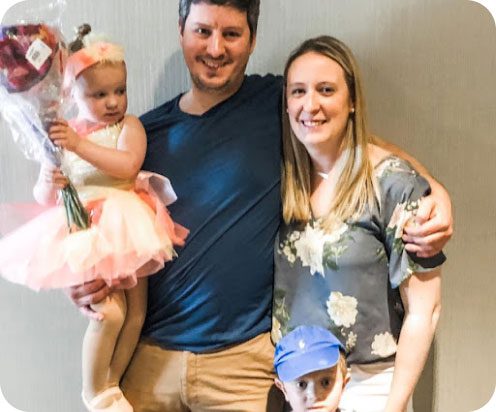Struggles During the COVID Pandemic
PCCD’s Early Intervention (EI) services have been a crucial part of 18-month-old Lilah’s life and family support system. But when the COVID-19 pandemic interrupted Lilah’s speech and occupational therapy (OT) services for a few weeks, their importance became even clearer to her parents, Brianna and Daniel Stetson of North Andover.
“During this down period, we experienced several setbacks,” Brianna says. They watched Lilah’s progress with some of her gross motor skills, vocal imitations, and food tolerances start to slip away.
When EI services resumed virtually, the family was able to breathe a sigh of relief and begin to adjust to a “new normal” that had suddenly thrust Brianna and Daniel into the roles of teacher, therapist, advocate, and full-time caregivers, in addition to their own careers. Thanks to the tele-Early Intervention services, Lilah has been able to resume her OT and speech therapy, continue her progress, and work toward closing the gap in her developmental milestones.
“Being able to continue these services at home during these unique and challenging times has been an invaluable resource that we couldn’t imagine not having,” Brianna says. “Having these services continue at home has allowed us to provide our children with the support that is crucial to their developmental and physical needs.”
Although Lilah and her family miss the one-on-one, in-person interactions with the PCCD team, having services virtually and from home has come with some unexpected benefits. For instance, it has allowed providers to see Lilah’s behavior when she’s at home with only her family, not on her best behavior for a visitor.
“Our team at the PCCD has been able to see some of the behaviors we are also grappling with and have many recommendations on how to appropriately re-direct or facilitate a more desired outcome,” Brianna says.
Additionally, the team has been able to provide Brianna and Daniel with the support and coaching they need to effectively implement feeding strategies.
“Because either my husband or I are the ones implementing and acting on the recommendations, our daughter has continued to show more receptiveness to our coaching and encouragement,” Brianna says. “We are incredibly grateful for this type of coaching and mentorship.”
PCCD’s virtual EI services have proved to be an invaluable layer of support during an incredibly difficult and strange time.
“Early Intervention and the PCCD have been a long-standing support system for our family,” Brianna says. “We wouldn’t even have known where to begin or how to navigate this new normal without the support and expertise from our service team.”



